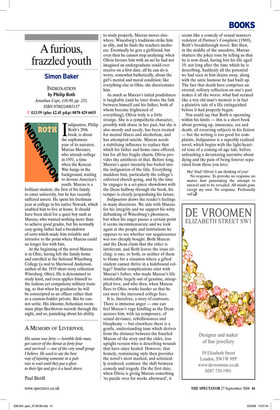A furious, frazzled youth
Simon Baker
INDIGNATION by Philip Roth Jonathan Cape, £16.99, pp. 233, ISBN 9780224085137 ✆ £13.59 (plus £2.45 p&p) 0870 429 6655 Indignation, Philip Roth’s 29th book, is about the sophomore year of its narrator, Marcus Messner, who attends college in 1951, a time when the Korean War hangs in the background, waiting to devour America’s youth. Marcus is a brilliant student, the first of his family to enter university, but he has recently suffered unrest. He spent his freshman year at college in his native Newark, which enabled him to live at home. It should have been ideal for a quiet boy such as Marcus, who wanted nothing more than to achieve good grades, but his normally easy-going father had a breakdown of sorts which made him irritable and intrusive to the point where Marcus could no longer live with him.
At the beginning of the novel Marcus is in Ohio, having left the family home and enrolled at the fictional Winesburg College (a nod to Sherwood Anderson, author of the 1919 short-story collection Winesburg, Ohio). He is determined to study hard, and even applies himself to the tedious yet compulsory military training, so that when he graduates he will be conscripted as an officer rather than as a cannon-fodder private. But he cannot settle. His irksome, bohemian roommate plays Beethoven records through the night, and so, panicking about his ability to study properly, Marcus moves elsewhere. Winesburg’s traditions strike him as silly, and he finds the teachers mediocre. Eventually he gets a girlfriend, but even then he cannot stop analysing: when Olivia favours him with an act he had not imagined an undergraduate could ever receive on a first date, all he can do is worry, somewhat bathetically, about the girl’s mental and moral condition; like everything else in Ohio, she disorientates him.
As much as Marcus’s initial prudishness is laughable (and he later draws the link between himself and his father, both of whom become frightened of everything), Olivia truly is a little strange. She is a sympathetic character, possibly with abuse in her past, but she is also moody and needy, has been treated for mental illness and alcoholism, and has attempted suicide. Marcus needs a stabilising influence to replace that which his father and home once offered, but for all her fragile charm, Olivia provides the antithesis of that. Before long, Marcus’s quiet intensity has boiled into the indignation of the title. Everything maddens him, particularly the college’s enforced church-going, and by the time he engages in a set-piece showdown with the Dean halfway through the book, his temper is clearly jeopardising his future.
Indignation draws the reader’s feelings in many directions. We side with Marcus for his integrity and we support his witty debunking of Winesburg’s phoniness, but when his anger passes a certain point it seems incommensurate and we look again at the people and institutions he opposes to see whether our acquiescence was too cheaply bought. Both Marcus and the Dean claim that the other is intolerant, and Roth leaves the issue circling: is one, or both, or neither of them to blame for a situation where a gifted student cannot thrive in a hidebound college? Similar complications exist with Marcus’s father, who made Marcus’s life intolerable largely out of genuine, misapplied love, and who then, when Marcus flees to Ohio, works harder so that he can meet the increased college fees.
It is, therefore, a story of contrasts. There is immense anger — one can feel Marcus’s rage kindling as the Dean accuses him, with icy composure, of sexual deviance, rebelliousness and blasphemy — but elsewhere there is a gentle, understanding tone which derives from the distance between the frazzled Marcus of the story and the older, less uptight version who is describing wounds that have since healed. However, that homely, reminiscing style then provides the novel’s most marked, and artistically rendered, contrast: the shift between comedy and tragedy. On the first date, when Olivia is giving Marcus something ‘to puzzle over for weeks afterward’, it seems like a comedy of sexual manners redolent of Portnoy’s Complaint (1969), Roth’s breakthrough novel. But then, in the middle of the anecdote, Marcus shatters the jokey tone by telling us that he is now dead, having lost his life aged 19, not long after the time which he is describing. Suddenly all the potential we had seen in him drains away, along with the antic humour he had built up. The fact that death here comprises an eternal, solitary reflection on one’s past makes it all the worse: what had seemed like a wry old man’s memoir is in fact a plaintive tale of a life extinguished before it had properly begun.
You could say that Roth is operating within his limits — this is a short book about growing up, innocence, sex and death, all recurring subjects in his fiction — but the writing is too good for complaints. Indignation is a superbly realised novel, which begins with the light-hearted tone of a coming-of-age tale, before unleashing a devastating narrative about dying and the pain of being forever separated from those you love:
Ma! Dad! Olivia! I am thinking of you!
No response. To provoke no response no matter how painstaking the attempt to unravel and to be revealed. All minds gone excet my own. No response. Profoundly sad .8










































































 Previous page
Previous page